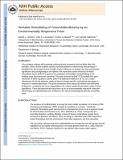Heritable Remodeling of Yeast Multicellularity by an Environmentally Responsive Prion
Author(s)
Holmes, Daniel L.; Lancaster, Alex K.; Lindquist, Susan; Halfmann, Randal
DownloadLindquist_Heritable remodeling.pdf (4.923Mb)
PUBLISHER_CC
Publisher with Creative Commons License
Creative Commons Attribution
Terms of use
Metadata
Show full item recordAbstract
Prion proteins undergo self-sustaining conformational conversions that heritably alter their activities. Many of these proteins operate at pivotal positions in determining how genotype is translated into phenotype. But the breadth of prion influences on biology and their evolutionary significance are just beginning to be explored. We report that a prion formed by the Mot3 transcription factor, [MOT3⁺], governs the acquisition of facultative multicellularity in the budding yeast Saccharomyces cerevisiae. The traits governed by [MOT3⁺] involved both gains and losses of Mot3 regulatory activity. [MOT3⁺]-dependent expression of FLO11, a major determinant of cell-cell adhesion, produced diverse lineage-specific multicellular phenotypes in response to nutrient deprivation. The prions themselves were induced by ethanol and eliminated by hypoxia—conditions that occur sequentially in the natural respiro-fermentative cycles of yeast populations. These data demonstrate that prions can act as environmentally responsive molecular determinants of multicellularity and contribute to the natural morphological diversity of budding yeast.
Date issued
2013-03Department
Massachusetts Institute of Technology. Department of BiologyJournal
Cell
Publisher
Elsevier
Citation
Holmes, Daniel L.; Lancaster, Alex K.; Lindquist, Susan and Halfmann, Randal. “Heritable Remodeling of Yeast Multicellularity by an Environmentally Responsive Prion.” Cell 153, no. 1 (March 2013): 153–165 © 2013 Elsevier Inc
Version: Author's final manuscript
ISSN
0092-8674
1097-4172